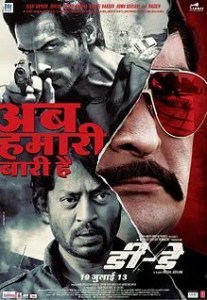 2.5 Stars (out of 4)
2.5 Stars (out of 4)
Buy or rent the movie at iTunes
Buy the DVD at Amazon
Buy the soundtrack at Amazon
Editor’s note: So, a lot of people have been coming to this review via IMDb, because Gunday is — after just one week in theaters — already the lowest-rated movie of all time. Lower than The Hottie and the Nottie, Birdemic, and even Manos: The Hands of Fate. As of February 22, it’s at 1.2/10, a full .8 ahead of its nearest competitor.
Is Gunday really that bad? As a movie, no. You can read below how I thought it was problematic, but passable.
Then why is it ranked as IMDb’s worst movie ever? It looks like the movie’s portrayal of the Bangladesh Liberation War has angered a lot of people, who have coordinated to give it as many 1/10 reviews as possible. Look at the IMDb user reviews, and several of them have the exact same title: “Manipulating Bangladesh’s Liberation War history.”
Unfortunately, I’m not familiar with the true events that Gunday references. So while I still think it’s okay as a film, I certainly wouldn’t vouch for it being historically accurate!
Abrupt changes in tone and an abundance of slow-mo keep Gunday (“The Outlaws“) from establishing its own voice or finding a rhythm.
The story begins in 1971 at the end of the war that established Bangladesh as an independent nation. 14-year-old orphans Bikram (Darshan Gurjar) and Bala (Jayesh V. Kardak) survive the deprivation of a refuge camp by working as gun runners. When Bala shoots an army officer to save Bikram’s life, the boys flee to Calcutta.
Fast-forward ten years, and Bikram (Ranveer Singh) and Bala (Arjun Kapoor) are the unofficial kings of Calcutta, controlling all of the city’s black market commodities. The buddies do everything together, while savvy Bikram keeps Bala’s temper in check.
As soon as the guys’ present-day circumstances are established, an anchor drops onto the plot in the form of a love interest: a cabaret dancer named Nandita (Priyanka Chopra).
The premise that two guys are such good buddies that they decide to share the same girl could be cute in a more lighthearted movie than this one. But Gunday starts out grim, and it returns to being so once Nandita chooses one guy over the other. The thirty-minute wacky romantic-comedy interval doesn’t fit.
That’s not the only aspect of Gunday that doesn’t make sense tonally. Action sequences vary from dramatic and realistic to outright loony. Bala causes an earthquake before shooting up through the ground, as though propelled by a geyser. A fish is wielded as a deadly weapon.
The goofy action sequences are pretty entertaining, but again, they don’t feel right in the context of the movie. Gunday would’ve been better had writer-director Ali Abbas Zafar established surreal action as the dominant tone of the movie.
Such a tone would’ve also explained the volume of slow-motion used in the film. Walking, running, dancing: seemingly every form of motility is presented in slow-motion. The impact of the two scenes in the movie that actually benefit from the treatment is dulled by its application to so many mundane activities.
There is a ridiculous amount of skin on display in Gunday, and not just by Chopra’s cabaret dancer. In the movie’s funniest fight scene, Bikram and Bala exchange blows, ripping off each other’s shirts in the process. The shirts come off in slow-mo (of course), exposing Singh’s and Kapoor’s hairless, tanned, greased-up, muscular torsos. It’s not supposed to be as hilarious as it is.
As much attention as is given to the guys’ muscles — with special attention paid to Singh’s perky buns — Irrfan Khan wins for Best Body, and he gets to keep his clothes on.
Khan’s star power is on full display as the police inspector tasked with bringing down Bikram and Bala and returning order to Calcutta. Saurab Shukla’s understated role as the lawyer who watches over Bikram and Bala is also notable.
Chopra is fine as Nandita, though she’s not given much to do besides look sexy, early on. Her performance improves as Nandita realizes the consequences of having strained the friendship between the two gangsters.
It almost seems as if the role of Bikram was written with Singh in mind, and his charisma is undeniable. Kapoor is very good at playing edgy anti-heroes, and it’s a shame when Bala gets turned into a mindless beefcake goofball during the romance portion of the movie. His hair-trigger is shelved for the sake of song-and-dance numbers and out-of-place comedy bits.
As a surreal dark comedy or action flick, Gunday could’ve been really interesting, but there’s no place for light romantic tomfoolery in such a film. A clear vision rather than a please-all approach would’ve done wonders.
Links
Like this:
Like Loading...






